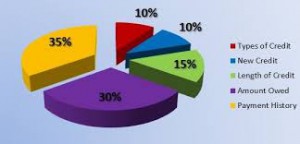Whether shopping for a Home Loan or Home Insurance, both Lenders & Insurers charge more and may even reject your request if you have a low FICO score. The range of scores will go from 300 – 850 with 760 & above considered desirable.
Here’s how you may doing yourself harm.
1.) Bad Timing, Big Spender:
 The bigger your total balance as a percent of your total credit, the lower your score will be. Rex Johnson, with Lending Solutions Consulting, studies FICO sores. He estimates you loose 1 point for every percent of your credit limit that you use. If you have a total credit limit of $10,000 and an outstanding balance of $4,000. (40%), your score would be 40 points lower than if you had a $0 balance. Ideally you want your balance below 30% of your limit.
The bigger your total balance as a percent of your total credit, the lower your score will be. Rex Johnson, with Lending Solutions Consulting, studies FICO sores. He estimates you loose 1 point for every percent of your credit limit that you use. If you have a total credit limit of $10,000 and an outstanding balance of $4,000. (40%), your score would be 40 points lower than if you had a $0 balance. Ideally you want your balance below 30% of your limit.
BOOST YOUR SCORE:
Dont’ charge anything 60 days prior to applying for a loan. If you can’t pay the balance off, try to keep it under 30% of your total credit limit.
2.) Slacker:
Sending payments late really hurts. Johnson says, if you’re 30 days past due and your balance is still unpaid, your score could take a 60 point hit. That kind of drop could mean a much higher interest rate on loans.
He estimates late payments from your past that have been paid off will have less and less affect as time goes on but may cost you 15-20 points.
BOOST YOUR SCORE:
Pay the bill in full and mail it when it arrives. If you cannot pay it in full, pay at least the minimum payment due.
3.) Too Thin:
When it comes to your credit record, fat is good. Even if you’re the most responsible bill payer, your credit score won’t be as high as it could be if you had even just one credit account. Lenders like to see borrower responsibility managing a mix of revolving debt like credit cards and installment debt like a mortgage or car loan.
BOOST YOUR SCORE: If you’re too thin on credit, consider opening a credit card account or taking out a car loan or small bank loan to fatten your credit record.
4.) Nonchalant:
You may be a great credit risk, but your score won’t reflect that if there are errors on your credit report. Unless you make yourself aware of what’s in your report a few months prior to applying for a loan, you’ll have no idea how a lender will perceive you, right or wrong.
BOOST YOUR SCORE:
Order a free credit report every year from each of the three major credit bureaus and make sure they’re accurate, if not get them corrected before applying for a home loan.
